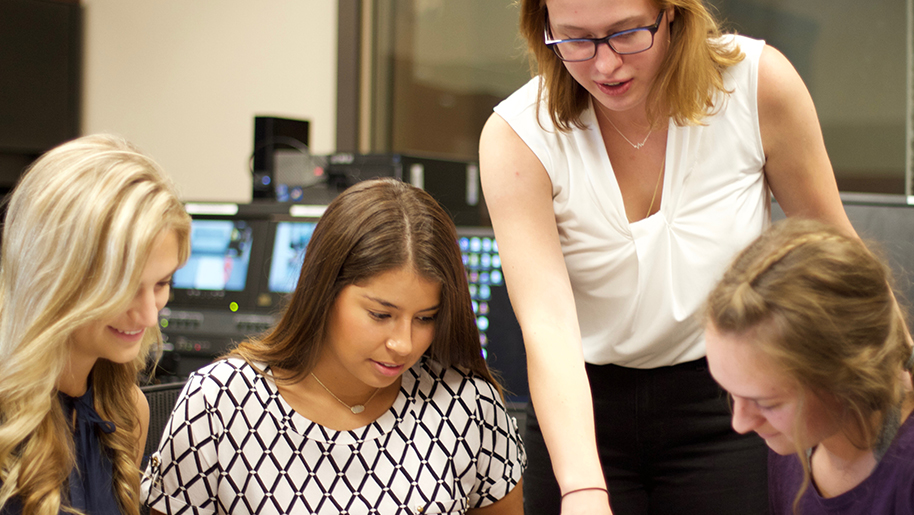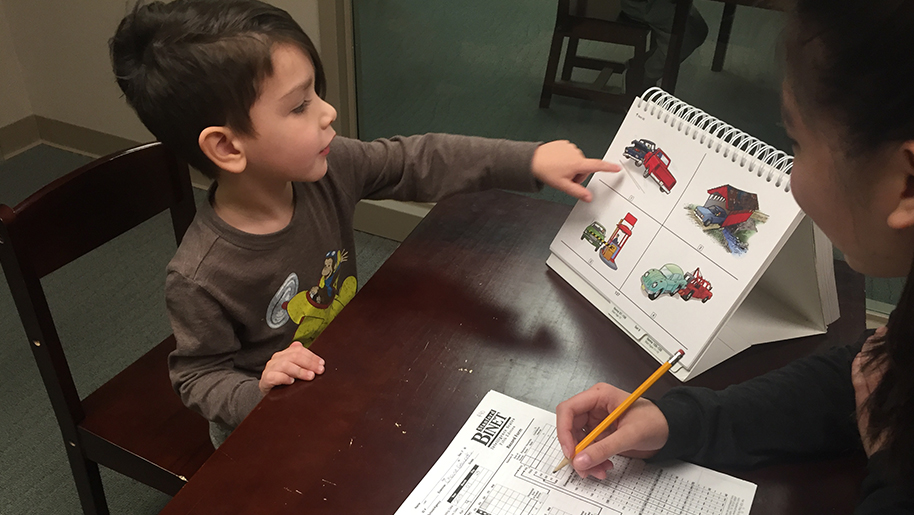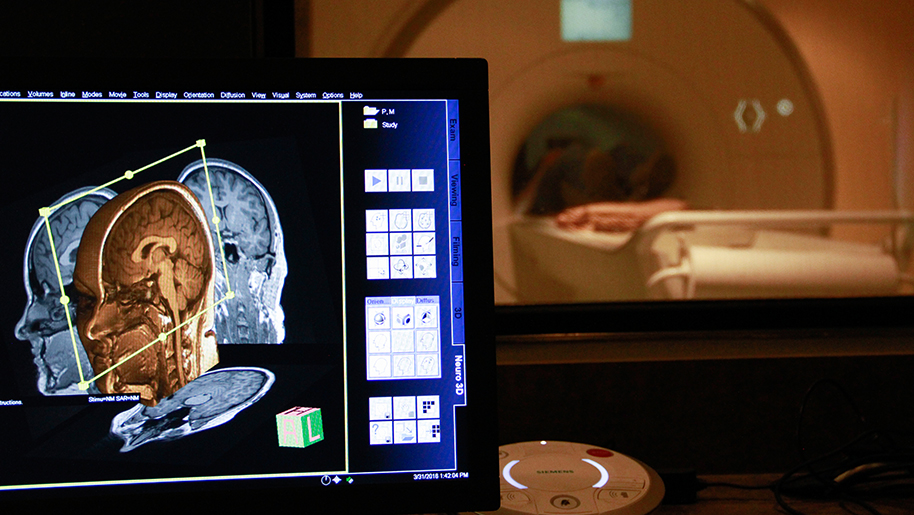Human Development and Family Sciences
Research in Human Development and Family Sciences
In the Department of Human Development and Family Sciences (HDFS) at Texas Tech faculty conduct research about individuals, romantic partners, and families across the lifespan. The Barton Research Suite houses cutting-edge research spaces in which multiple types of research methodologies take place. In HDFS we have the Child Development Research Center and the Center for Early Head Start, in which faculty and students also conduct research.
We also have access to several facilities, institutes, and centers across campus, including the Neuroimaging Institute and the Burkhart Center for Autism Education and Research. Below is a list of the current research laboratories and the faculty who direct these labs.
Child Development Lab, directed by Dr. Yoojin Chae: This lab is committed to the study of cognitive and social development in childhood. Their
research emphasis primarily concerns children’s memory, being particularly directed
toward several
controversial issues regarding stress, coping, and autobiographical memory. Projects
examine children’s eyewitness ability and suggestibility, attachment and memory for
distressing experiences, parent-child reminiscing, childhood maltreatment and memory,
trauma-related psychopathology, and narrative skill and memory accuracy.
Child Development and Relationships Lab, directed by Dr. Wonjung Oh: The lab focuses on investigating developmental change patterns of social behavior, mental
health, regulatory functioning, and relationship processes (mother-child; father-child;
spouse; peer) using innovative advanced methodology. Dr. Oh’s research group integrates
biosocial characteristics of individual children, family and peer in identifying adaptive
and maladaptive developmental pathways across various
transitions in the school and family environments.
Dynamics of Emotions and Adolescent Resilience (DEAR) Lab, directed by Dr. Chiang: The Dynamics of Emotions and Adolescent Resilience (DEAR) Lab explores how daily family interactions shape emotional and interpersonal resilience in adolescence. Grounded in developmental psychopathology and family systems theory, our research focuses on dynamic parent-adolescent processes—such as emotional reactivity, co-regulation, and connectedness—and how they influence mental health outcomes like depression, anxiety, and suicidality. Using innovative methods including ecological momentary assessment, GPS tracking, and intensive longitudinal designs, we aim to capture within-family variability in real time and inform interventions that strengthen both adolescent and family resilience.
Early Childhood Development, directed by Dr. Malinda Colwell: The Early Childhood Development Lab is a multidisciplinary lab focused on multiple aspects of young children’s social and emotional development, including those relationships most salient to the children (i.e, mothers, fathers, teachers, caregivers). Projects include a food insecurity intervention with children and mothers in Malawi, Africa, early childhood teachers’ beliefs about children’s social development, first time expectant fathers, and the socio-emotional outcomes associated with PBS show Daniel Tiger’s Neighborhood.
Economic Hardship, Families, and Development, directed by Dr. Monica Martin: This lab investigates the influence of economic disadvantage and other types of disparities (racial, ethnic, and educational) on the emotional and behavioral health of individuals and families. This research primarily focuses on behavioral health involving problem behaviors that negatively influence health and well-being such as delinquency, antisocial behavior, and substance involvement. This research group is particularly focused on gaining a better understanding of processes that promote resilience and help to prevent and interrupt these detrimental behavior patterns.
Emerging Adulthood, directed by Dr. Alan Reifman: Emerging adulthood (EA) is a transitional stage or process in between adolescence and full-fledged adulthood. Researchers generally consider EA to begin around age 18 and last until 25 or 30. Many young people use their EA years to try different jobs, travel, volunteer, and just generally “find themselves,” whereas others act in ways that some scholars consider unproductive (e.g., heavy drinking, hook-ups). The lab studies emerging adulthood in a variety of ways.
Families and Sexuality, directed by Dr. Dana Weiser: This lab explores how family experiences are associated with adults’ later romantic relationships and sexual health. Our work explores how parents communicate and model behaviors which later influence individuals as they enter into their own relationships and become sexually active. We study how and what families teach us about infidelity, sexual health, and sexual violence. We utilize a variety of perspectives, such as social cognitive theory, feminist theories, and personality theories to frame our work.
Gender and Relationships, directed by Dr. Elizabeth Sharp: The Gender SEAMS (Sexuality, Embodiment, Affect, Movement, and Space) research team seeks to critically examine the ways in which bodies and environment are shaped by shared cultural experience. The research team has multiple projects in progress which are woven together by the common thread of examining gender from a critical, intersectional, feminist perspective. Our view of gender is pluralistic, non-binary (i.e. multiple femininities, masculinities, and sexualities exist).
Parenting and Early Development (PEDs) Lab, directed by Dr. Savannah Girod: The PEDs Lab examines the individual, dyadic, and family processes that influence parenting and children's socioemotional and health outcomes during infancy and early childhood. This lab takes a multimethod approach (e.g., questionnaire, observational, psychophysiology) to examine the early biopsychosocial process spanning the perinatal period that influence parent-child interactions and trajectories of normative and atypical development. In doing so, we consider the roles of both positive (i.e., maternal sensitivity) and negative (harsh parenting, child maltreatment) parenting. Research in this lab also investigates how mother-child and father-child dyads dynamically coordinate their physiology, emotions, and behavior in the moment (i.e., co-regulation) and how these interpersonal processes operate as risk or protective mechanisms. Ultimately, the PEDs Lab aims to identify malleable targets for prevention and intervention efforts to improve the lives of young children and their families.
Pathways to Adult Resilience and Healthy Aging (PARA) Lab,directed by Dr. Athena Chan: The PARA Lab is dedicated to examining the psychosocial mechanisms of resilience and healthy aging facing stressors in adulthood. Particularly, we explore how intergenerational relationships may promote and/or hinder the pathways within sociocultural contexts across the West and the East. We use multiple methods (e.g., surveys, individual interviews, card-sorting, ambulatory assessment) to examine the underlying individual and family processes of at-risk adults. Ultimately, we aim to integrate family theories and empirical research to better understand how to improve outcomes of adults and families in their middle and late adulthood.
Positive Youth Development (PYD), directed by Dr. Elizabeth Trejos: This lab investigates the effects of individual and contextual factors, toxic-stress, trauma,
resilience and well-being on adolescence development with a particular focus on minorities
(race, ethnicity, immigrant groups) and vulnerable youth (foster youth, juvenile justice).
Researchers in this lab generate new knowledge using a multidisciplinary Cross-Cultural/Cross-National
Comparative Mixed-Method lens and Participatory Action Research approaches. PYD lab
members, national and international collaborators, and community partners work closely
to support the well-being and positive development of youth.
Relationships, Social Networks, and Media, directed by Dr. Jacki Fitzpatrick: This lab focuses on individuals’ actual social relationships (with romantic partners, family friends, peers), parasocial relationships (individuals’ sense of connectedness to celebrities/fictional characters) and media representations of social relationships (such as children’s books about international adoptive families). The research on actual relationships typically focuses on young adults (e.g., undergraduates, individuals 20-30 years of age).
Research in Early Developmental Studies (RED), directed by Dr. Ann Mastergeorge:
The RED Lab is dedicated to studying early development in children with concerns for autism spectrum
disorders. By examining the environments surrounding children and how they interact
with those environments, steps can be made toward defining trajectories and risk factors
in their development. Identifying risk factors earlier in development is the first
step in applying earlier therapeutic practices, helping to reduce the total impact
of disorders such as autism spectrum disorders on a child's development. The RED Lab
utilizes innovative technology like eye-tracking and robotics to assess patterns of
social, attentional, and communication behaviors of typical and at-risk children.
Romantic and Marital Relationships, directed by Dr. Sylvia Niehuis: Research in the SMITTEN lab focuses on the development of dating, premarital, and marital relationships within social and cultural contexts. The group's largest longitudinal project focuses on the transition from courtship to marriage and changes in the early years of marriage, in a sample of predominantly Hispanic newlywed couples. Other projects focus on a variety of topics, including attachment, uncertainty, personality, trust, commitment, communication, love, conflict resolution, sexuality, idealization, transgressions, and disillusionment within romantic relationships. SMITTEN researchers use a variety of cutting-edge methodologies, such as functional Magnetic Resonance Imaging (fMRI), couple-interaction experiments, language analysis, physiological assessments, face-to-face interviews, and surveys.
Social Influence on Brain & Socioemotional development (SIBS) Lab, directed by Dr. Christy Rogers: The SIBS Lab investigates how salient relationships, such as siblings, parents, and peers, shape development from early adolescence into emerging adulthood. This lab utilizes multiple methods (e.g., video-taped interactions, fMRI, surveys) to examine the processes through which social relations influence adolescent decision-making, behavior, and well-being across time. The SIBS Lab ultimately aims to better understand the social resiliency factors and underlying mechanisms that promote positive youth development.
Stress, Aging, and Relationships (STAR) Lab, directed by Dr. Ryan L. Brown: The STAR Lab investigates how fundamental human experiences, like love and loss, contribute to biopsychosocial health as individuals age. The lab’s primary focus is often examining stress-response processes through the lens of psychoneuroimmunology and with a variety of methods (e.g., experimentally in the lab, using ecological momentary assessment to assess stress responsivity in daily life). By integrating theories and methods from human development, psychology, neuroimmunology, and autonomic psychophysiology, the STAR Lab ultimately aims to map the complex ways in which romantic relationships shape biopsychosocial health across the lifespan.
Human Development and Family Sciences
-
Address
Texas Tech University, P.O. Box 41230, Lubbock, TX 79409-1230 -
Phone
806.742.3000 -
Email
hs.webmaster@ttu.edu



